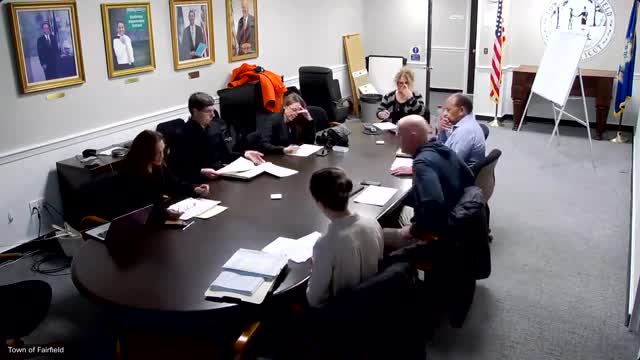Fairfield WPCA: new state rule threatens compost revenue; committee reviews draft long-term financial plan
Get AI-powered insights, summaries, and transcripts
Subscribe
Summary
Members of the Board of Finance fund balance/borrowing subcommittee met in January in Fairfield to review a preliminary long‑term financial and capital plan for the Water Pollution Control Authority (WPCA), and were told a recent state public act reclassifying biosolids could eliminate compost revenue and add roughly $1 million a year in sludge management costs.
Members of the Board of Finance fund balance/borrowing subcommittee met in January in Fairfield to review a preliminary long‑term financial and capital plan for the Water Pollution Control Authority (WPCA). WPCA management told the committee a change in state law now classifies biosolids in ways that have ended local compost sales and could add roughly $1 million a year in sludge‑management costs.
The committee was presented a draft capital project schedule and financial model that staff said remains preliminary while they fill data gaps and reconcile accounting classifications. Michelle, general manager of the WPCA, told the subcommittee the agency is still seeking two additional years of historical water‑use data to improve rate projections and that a line in a recent state public act has unexpectedly limited the WPCA's ability to sell composted biosolids.
"We're no longer going to gain any revenue off of it," Michelle said of the compost sales, adding the WPCA is evaluating alternatives and expects more firm cost estimates in mid‑February. She said the municipality and the WPCA have been storing compost material since the rule change; the vendor that had taken the material has limited capacity and current on‑site storage must be addressed by spring.
Michelle also told the committee that the public act — which the WPCA staff said took effect in stages (the biosolids provision effective Oct. 1) — classifies biosolids in a way that limits land application when any level of certain per‑ and polyfluoroalkyl substances (PFAS) is present. She said Connecticut has not yet provided technical guidance or thresholds as some other states have, and that WPCA staff have reached out to state representatives and to the state agency for clarification.
"It could be upwards of a million dollars per year for sludge management," Michelle told the subcommittee when asked about the likely expense.
Committee members pressed staff on several other capital‑plan priorities and schedule changes. Staff said Fairfield Beach pump station remains the highest priority and that Center Street and Pine Creek pump stations have been reprioritized because of operational condition and climate‑resiliency concerns. Mill River’s force main was described as at end of life with multiple likely failure points in environmentally sensitive areas; staff said the unused parallel main has deteriorated and the recommendation may be to replace that spare force main rather than attempt repairs.
The draft plan also includes a $700,000 estimate for a specialized heavy‑duty vacuum/flush truck to maintain and restore collection system lines; staff said other fleet replacements are likely but generally smaller and will be handled through operating budgets over time.
On finance and modeling, staff acknowledged discrepancies between the financial model in the packet and the town’s budget system (Munis). Sabrina, the town budget director, was not present but was identified repeatedly as the person working to reconcile differences. Subcommittee members asked for clearer footnotes and a reconciliation of historical line items that now appear inconsistent from year to year.
Members discussed the policy question of how much of WPCA capital should be funded by the WPCA’s self‑supporting debt versus the town. The committee asked staff to propose a funding‑policy recommendation: a formal policy describing project types and what portion should be town‑funded (for example, projects supporting new development). That policy would be considered by the WPCA commission and returned as a recommendation to the Board of Finance.
Staff also discussed possible external funding sources. Management said some grant and low‑interest loan programs could apply but that certain contracting approaches being considered (a progressive design‑build delivery model) may not be covered under current Connecticut Clean Water funding rules without state engagement or legislative change.
The committee asked staff to return with a final capital plan in February, with: (1) the two additional years of consumption data; (2) reconciled budget classifications and historical footnotes; (3) updated sludge‑management cost estimates; and (4) a proposed plant‑funding policy the WPCA commission could endorse.
The subcommittee received the draft update and scheduled follow‑up; no formal policy vote or binding financial authorization was taken at the meeting.
